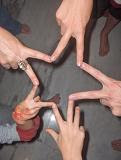
^ Sthiti ke koi desh kisi ke.....
So, I am in Mumbai today. It has been a good work day.
What I really enjoy is coming into the hotel where I stay up here. Even though I have not been here in a few months, I am still recognized and they greet me by name - and in Hindi! My entire check in process is in Hindi. It's awesome. I have learned that you don't need to understand each and every word (I get most of their Hindi, anyway), but it is even more important to get the gist of what is being said.
Then my driver, Horace, wasn't even phased when I changed form English to Hindi. He did mention that I was the first foreigner her had ever seen speaking Hindi. So, that felt good. Horace had a few years on him, so he has had decades to catch another foreigner speaking Hindi.
What is really stark is that the differnece between the Hindi here and in Hyderabad. And Delhi - that is the heart of proper Hindi. That's shudh Hindi, pure Hindi. Had I lived in Mumbai or Delhi, I would almost certainly speak Hindi a little bit better than I do.
Here's the thing for any American reading the blog back in the US - and listen closely - there are hundreds of different Hindis. There is no single form of Hindi. Hindi develops in small pockets toward unique ends such that it is truly both a national language and also a local language. It is said that every 500 kilometers that you drive in India, the language changes. It's true. It's amazing. I would doubt that there is a place on Earth with as much linguistic diversity as India.
Well, one...
Only New Guinea has more language density than India - of the 6,912 languages on Earth, 820 of them are in New Guinea. Wow.
The same diversity is true with Telugu and Tamil and Malayalam (a language that is also a palindrome) and Kannada and Marathi and so on..... there are forms of it that differ every few hundred miles.
Why is this? Those of us who speak English have filled in places like New Zealand, Jamaica, the US, Canada, South Africa, Australia and other places and lived in relative isolation for the first couple hundred years of the colonial era..... and yet we all understand each other today.
Why are Indian languages different?
Because it's just different here. It's lingusitic chaos.
It's like India itself.... languages here are an explosion of variables and influences that exert themselves until they become something new - and when you pull back from the chaos, you get the elegance and pure beauty that can be found here.
That is life in India. And that is language in India.
